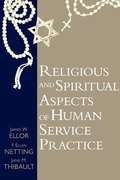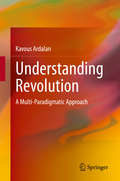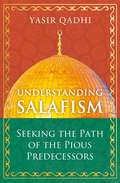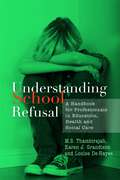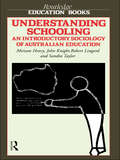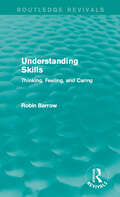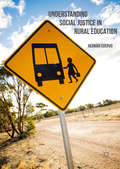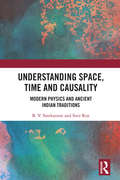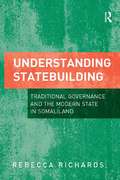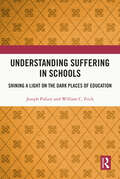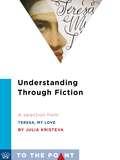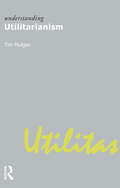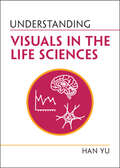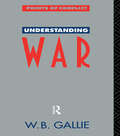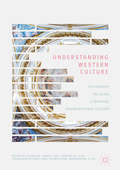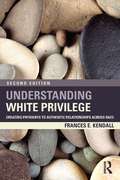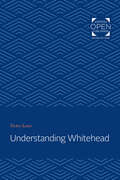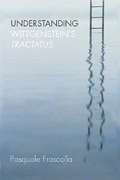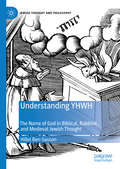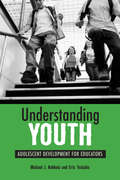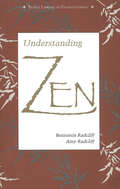- Table View
- List View
Understanding Religious and Spiritual Aspects of Human Service Practice
by F. Ellen Netting James Ellor Jane M. ThibaultContending that despite current efforts to make social workers sensitive to differences of race, ethnicity, and gender, the diversity and impact of religious beliefs has often been overlooked, three professors of social work/human services offer a guide to direct practice concerns. Spiritual assessment, positive and pathological uses of religious practice, and the need for spiritual self-awareness among human-service workers are explored, as are issues related to community, congregation, and making of public policy. Annotation c. Book News, Inc., Portland, OR (booknews.com)
Understanding Revolution: A Multi-Paradigmatic Approach
by Kavous ArdalanThis book applies a multiparadigmatic philosophical frame of analysis to the topic of social revolution. Crossing two disciplines and lines of literature—social philosophy and social revolution—this book considers different aspects of social revolution and discusses each aspect from four diverse paradigmatic viewpoints: functionalist, interpretive, radical humanist, and radical structuralist. The four paradigms are founded upon different assumptions about the nature of social science and the nature of society. Each paradigm generates theories, concepts, and analytical tools that are different from those of other paradigms. An understanding of different paradigms leads to a more balanced understanding of the multi-faceted nature of the subject matter.In this book, the first chapter reviews the four paradigms. Using the Iranian Revolution as exemplar, the next few chapters provide paradigmatic explanations for a particular aspect of revolution: culture, religion, ideology. With this background, the book introduces a comprehensive approach to the understanding of revolution. The final chapter concludes by recommending further paradigmatic diversity. This book will be of particular interest to students and researchers interested in social revolution, political sociology, and political theory.
Understanding Salafism: Seeking the Path of the Pious Predecessors
by Yasir QadhiA comprehensive overview of the most misunderstood movement in modern Islam: Salafism.The Salafi movement invokes fear and dread in outsiders who treat Salafism as synonymous with religious extremism. For Salafis themselves, it&’s a jealously guarded title, always in danger of dilution. Salafism has changed the face of Islam; its ideas reach far outside its own ranks. Yet popular portrayals never go beyond hackneyed stereotypes. In Understanding Salafism, Dr Yasir Qadhi delves into the origins of the movement, from the earliest debates in Islam to Salafism today, in both the Western and Islamic worlds. In an analysis covering Salafism in the Middle East, Europe, the United States and Africa, he illuminates Salafism&’s theological ideas, the debates within Salafism about political participation, and its relationship to other schools in Sunni Islam.----- Yasir Qadhi is a resident scholar of the East Plano Islamic Center in Texas, and dean of the Islamic Seminary of America. He is one of the few people who has combined a traditional Eastern Islamic seminary education with Western academic training in the study of Islam. ----- Table of ContentsList of Figures Preface Conventions 1 Introduction: A Bird&’s Eye View of Salafism 2 A Comprehensive History of Salafi Thought: From its Origins to Modernity 3 Wahhabism and Salafism 4 Salafism and Islamism: A Case Study of the Muslim Brotherhood 5 The Phenomenon of Jihadi-Salafism 6 Global Salafism in the Contemporary World Epilogue Notes Bibliography Index
Understanding School Refusal: A Handbook for Professionals in Education, Health and Social Care
by M. S. Thambirajah Karen J. Grandison Louise De-Hayes` Combining educational and clinical perspectives, and with extensive use of case studies, the authors present recent research into the mental health problems associated with school refusal, such as anxiety and panic attacks, as well as the role that parental support plays in their children's school life. They also discuss the role of home tuition services and pupil referral units in extreme cases of school refusal, and provides concrete strategies for planning and organising services to manage the problem effectively. Understanding School Refusal is a valuable guide for professionals across the disciplines of education, health and social care, and will also be useful for training courses within these fields.' Education Today School refusal is a crippling condition in which children experience extreme anxiety or panic attacks when faced with everyday school life and this handbook aims to explore and raise awareness of the problem of school refusal in children and young people, and provide plans and strategies for education, health and social care professionals for identifying and addressing this problem. Combining educational and clinical perspectives, and with extensive use of case studies, the authors present recent research into the mental health problems associated with school refusal, such as anxiety and panic attacks, as well as the role that parental support plays in their children's school life. They also discuss the role of home tuition services and pupil referral units in extreme cases of school refusal, and provides concrete strategies for planning and organising services to manage the problem effectively. Understanding School Refusal is a valuable guide for professionals across the disciplines of education, health and social care, and will also be useful for training courses within these fields.
Understanding Schooling: An Introductory Sociology of Australian Education
by Sandra Taylor John Knight Robert Lingard Miriam HenryFirst published in 1990. Routledge is an imprint of Taylor & Francis, an informa company.
Understanding Skills: Thinking, Feeling, and Caring (Routledge Revivals)
by Robin BarrowIt is widely agreed that education should involve the development of understanding, critical thinking, imagination, and emotions. However, this book, first published in 1990, argues that our views to these key concepts are confused and inaccurate, and therefore what we do in schools is generally inappropriate to our ideal. This book will be of interest to students of education and philosophy.
Understanding Social Justice in Rural Education
by Hernán CuervoThis book explores what social justice looks like for rural schools in Australia. The author challenges the consensus that sees the distribution of resources as the panacea for the myriad challenges faced by rural schools and argues that the solution to inequality and injustice in rural settings has to take into account other important dimensions of social justice such as recognition and association. These include teachers' concerns for issues of power, respect, and participation in their work that extend to policy-making processes and implementation; students' post-school aspirations and, finally, parents' hopes and fears for their children's futures and the sustainability of their community. The book brings together political and social theory with education and youth studies, provides new insights about the complex nature of schooling in rural places, and makes a strong connection between schooling and the people and communities it serves.
Understanding Space, Time and Causality: Modern Physics and Ancient Indian Traditions
by Sisir Roy B.V. SreekantanThis book examines issues related to the concepts of space, time and causality in the context of modern physics and ancient Indian traditions. It looks at the similarity and convergence of these concepts of modern physics with those discussed in ancient Indian wisdom. The volume brings the methodologies of empiricism and introspection together to highlight the synergy between these two strands. It discusses wide-ranging themes including the quantum vacuum as ultimate reality, quantum entanglement and metaphysics of relations, identity and individuality, and dark energy and anti-matter as discussed in physics and in Indian philosophical schools like Vedanta, Yoga, Buddhist, Kashmiri Shaivism and Jaina Philosophy. First of its kind, this book will be an essential read for scholars and researches of philosophy, Indian philosophy, philosophy of science, theoretical physics and social science.
Understanding Statebuilding: Traditional Governance and the Modern State in Somaliland
by Rebecca RichardsMuch analysis of state building focusses on dissecting specific projects and attempting to identify what has gone ’wrong’ in states such as Afghanistan and Iraq. What draws less attention is what has gone ’right’ in non-interventionist statebuilding projects within 'unrecognised’ states. By examining this model in more depth a more successful model of statebuilding emerges in which the end goal of modern democracy and good governance are more likely to be realized. Indeed 'states-within-states’ such as Somaliland where external intervention in the statebuilding process is largely absent can provide vital new lessons. Somaliland is a functioning democratic political entity in northwestern Somalia which declared its independence from the troubled south in 1991 and then embarked on an ambitious project to create a democratic government and successful state in the post-conflict environment. The leaders and the people of Somaliland have since succeeded not only in maintaining peace and stability, but also in building the institutions of government and the foundations for democracy that have led to a succession of elections, peaceful transfers of power and a consolidation of democratization. The resulting state of Somaliland is widely hailed as a beacon of success within a politically turbulent region and provides a useful framework for successful statebuilding projects throughout the world.
Understanding Stuart Hall
by Helen Davis'This is the most lucid and engaged account of Stuart Hall's work. Meticulously, and with an exemplary generosity, Helen Davis patiently unravels the threads of Hall's intellectual history. The result is a most useful and thoughtful book, which could prove to be indispensable for students of cultural studies' - Graeme Turner, University of Queensland Understanding Stuart Hall traces the development of one of the most influential and respected figures within cultural studies. Focusing on Stuart Hall's writings over a period of nearly fifty years, this volume offers students and academics a cogent and exploratory route through complex and overlapping areas of analysis. In her critical assessment of Hall's most important contributions to academic and public debate, Davis shows the extent to which his analyses of race and ethnicity have been informed by early studies of Marxism, class and 'societies structured in dominance'. Davis offers fresh insight into the formation of one of the most prolific, charismatic and controversial intellectuals of his generation. Despite having been branded a 'cultural pessimist', Stuart Hall has long been associated with encouraging new, cutting-edge scholarship within the field. This volume concludes with a discussion of Hall's most recent political and academic interventions and his continuing commitment to innovation within the visual arts.
Understanding Suffering in Schools: Shining a Light on the Dark Places of Education
by William C. Frick Joseph PolizziDrawing inspiration from Dr. Willi Schohaus’s classic text The Dark Places of Education, this book contributes to the discussion by defining suffering in schools and providing a survey of the American school system’s inadequacies in the early twenty-first century. Through testimonies from former students on the ways they experienced suffering in school, this volume demonstrates how suffering can profoundly affect one’s academic growth and development—or worse. By analyzing the findings within a multidisciplinary ethical and educational framework, this volume presents a moral vision for understanding the role that suffering plays in school. Drawing on research in medicine, psychology, social sciences, religion, and education, this text weaves together many strands of thinking about suffering. This book is essential reading for academics, researchers, and postgraduate students in the fields of educational leadership, foundations of education, and those interested in both the history of education and critical contemporary accounts of schooling.
Understanding Terrorism in America (Extremism and Democracy)
by Christopher HewittChristopher Hewitt's comprehensive book surveys the characteristics and causes of terrorism and governmental responses to it. He also examines the organizational structure of terrorist networks, how they are financed and their ideological agendas. Groups covered include: Islamic fundamentalists, white and black racists, black nationalists, revolutionary communists, neo-Nazis, militant Jewish groups, anti-abortionists and émigré groups. This book is essential reading for students of American politics and terrorism. It also provides a highly readable account for interested readers wishing to know more about a topic which has recently become tragically relevant to world affairs.
Understanding Through Fiction: A Selection from Teresa, My Love: An Imagined Life of the Saint of Avila (To the Point)
by Julia KristevaBorn in 1515, Teresa of Avila survived the Spanish Inquisition and was a key reformer of the Carmelite Order. Her experience of ecstasy, which she intimately described in her writings, released her from her body and led to a complete realization of her consciousness, a state Julia Kristeva explores as it was expressed in Teresa's writing. Incorporating notes from her own psychoanalytic practice, as well as literary and philosophical references, Kristeva builds a fascinating dual diagnosis of contemporary society and the individual psyche while sharing unprecedented insights into her own character. Through her dazzlingly varied formats Kristeva tests the borderlines of atheism and the need for faith, feminism and the need for a benign patriarchy.
Understanding Utilitarianism (Understanding Movements In Modern Thought Ser.)
by Tim MulganUtilitarianism - a philosophy based on the principle of the greatest happiness for the greatest number of people - has been hugely influential over the past two centuries. Beyond ethics or morality, utilitarian assumptions and arguments abound in modern economic and political life, especially in public policy. An understanding of utilitarianism is indeed essential to any understanding of contemporary society. "Understanding Utilitarianism" presents utilitarianism very much as a living tradition. The book begins with a summary of the classical utilitarianism of the eighteenth and nineteenth centuries. Subsequent chapters trace the development of the central themes of utilitarian thought over the twentieth century, covering such questions as: What is happiness? Is happiness the only valuable thing? Is utilitarianism about acts or rules or institutions? Is utilitarianism unjust, or implausibly demanding, or impractical? and Where might utilitarianism go in the future?
Understanding Virtue Ethics (Understanding Movements in Modern Thought)
by Stan van HooftMore and more philosophers have advocated varieties of virtue-based ethics that challenge moral theory traditionally founded on moral obligation and the delineation of what is right or wrong in given situations. Virtue ethics, which focuses upon the character of moral agents more than on the moral status of their actions or the consequences of those actions, has become one of the most important and stimulating areas of contemporary ethical theory. "Understanding Virtue Ethics" is an accessible and lively introduction to the subject. It provides a broad overview of the history of virtue ethics from Aristotle to Nietzsche as well as examining the ideas of such contemporary writers as Ricoeur and Levinas. Major themes dealt with by moral theory are examined and how a virtue ethics approach to them differs from those of other traditions is explored. Practical problems of moral complexity such as abortion, euthanasia, and integrity in politics, and how they might be approached from a virtue perspective are considered. The charges of relativism and egoism that are often mounted against virtue ethics are rebutted and virtues that are especially relevant to contemporary life, namely, courage, taking responsibility, and reverence are examined in depth. Finally, the author argues that virtue ethics is highly relevant to our understanding of the moral dimensions of professional roles.
Understanding Visuals in the Life Sciences (Understanding Life)
by Han YuFrom photographs to micrographs, from the various types of graphs to fun, interactive visuals and games, there are many different forms in which science can be visualised. However, all of these forms of visualisation in the Life Sciences are susceptible to misunderstandings and misinformation. This accessible and concise book demonstrates the misconceptions surrounding the visuals used in popular life science communication. Richly illustrated in colour, this guide is packed with examples of commonly used visual types: photographs, micrographs, illustrations, graphs, interactive visuals, and infographics allowing visual creators to produce more effective visuals that aspire to being both attractive and informative for their target audience. It also encourages non-specialist readers to be more empowered and critical, to ask difficult questions, and to cultivate true engagement with science. This book is an invaluable resource for life scientists and science communicators, and anyone who creates visuals for public or non-specialist readers.
Understanding War: An Essay on the Nuclear Age (Points of Conflict)
by W B *Decd* W. B. GallieFirst published in 1990. With the exception of Clausewitz, no reflective thinker has seriously engaged with the concept of war - with its persistent changeability and the dominant direction of its changes.The results of this failure are seen in the extreme logical weakness of most debates, during the last two centuries, on the possibility of eliminating war and, since 1945, on the possibility of eliminating nuclear weapons.Orderly, clear, and reflective, Understanding War develops two main theses: first, that the horrendous escalation of war's destructiveness in this century is primarily the result of the inherently cumulative character of war itself rather than of the application to war of recent science-based technologies; and second, that the irreversible destructiveness of nuclear weapons suggests how joint action by the superpowers could prevent their being used in any future war.
Understanding Western Culture: Philosophy, Religion, Literature And Organizational Culture
by Guobin Xu Yanhui Chen Lianhua XuPromoting cultural understanding in a globalized world, this collection offers a new perspective on Western philosophy and religion through the voices of Chinese scholars. It examines the evolution of economic and political structures across the United States and the European Union, as well as key developments in various educational systems in the United Kingdom, Sweden, the US, France and Germany. As an interdisciplinary study situated at the intersection of sociology, history, culture and philosophy, this book re-examines pivotal structures and developments in Western countries and provides readers with a succinct yet effective way of mastering a deeper understanding of Western culture.
Understanding White Privilege: Creating Pathways to Authentic Relationships Across Race (Teaching/Learning Social Justice)
by Frances KendallKnowingly and unknowingly we all grapple with race every day. Understanding White Privilege delves into the complex interplay between race, power, and privilege in both organizations and private life. It offers an unflinching look at how ignorance can perpetuate privilege, and offers practical and thoughtful insights into how people of all races can work to break this cycle. Based on thirty years of work in diversity and colleges, universities, and corporations, Frances Kendall candidly invites readers to think personally about how race — theirs and others’ — frames experiences and relationships, focusing squarely on white privilege and its implications for building authentic relationships across race. This much-anticipated revised edition includes two full new chapters, one on white women and another extending the discussion on race. It continues the important work of the first, deepening our knowledge of the recurring history on which cross-race relationships issues exist. Kendall’s book provides readers with a more meaningful understanding of white privilege and equips them with strategies for making personal and organizational changes.
Understanding Whitehead
by Victor LoweOriginally published in 1962. The central aim of this book is to discuss the development of Alfred North Whitehead's thought and to underscore how it is unique. Understanding Whitehead collects nine essays written by Victor Lowe originally published between 1941 and 1961. The essays have been revised for inclusion in this volume.
Understanding Wittgenstein's Tractatus
by Pasquale FrascollaUnderstanding Wittgenstein's Tractatus provides an accessible and yet novel discussion of all the major themes of the Tractatus. The book starts by setting out the history and structure of the Tractatus. It then investigates the two main dimensions of the early Wittgenstein's thought, corresponding to the division between what language can say by means of its propositions and what language can only show. It goes on to discuss picture theory, logical atomism, extensionality, truth-functions and truth-operations, semantics, metalogic and mathematics, solipsism and value, metaphysics, and finally, Wittgenstein's idea of the duty of maintaining silence. Frascolla also proposes a new interpretation of the ontology of the Tractatus. Based on the identification of objects with qualia, the argument put forward in the book challenges the currently prevalent ideas of the ‘New Wittgenstein'. The paradoxical nature of the Tractatus itself, and the theme of "throwing away the ladder", are thus revisited in a new key. Understanding Wittgenstein's Tractatus is essential reading for anyone wishing to further their insight into one of the most influential works of twentieth-century philosophy.
Understanding YHWH: The Name of God in Biblical, Rabbinic, and Medieval Jewish Thought (Jewish Thought and Philosophy)
by Hillel Ben-SassonThis book unlocks the Jewish theology of YHWH in three central stages of Jewish thought: the Hebrew bible, rabbinic literature, and medieval philosophy and mysticism. Providing a single conceptual key adapted from the philosophical debate on proper names, the book paints a dynamic picture of YHWH’s meanings over a spectrum of periods and genres, portraying an evolving interaction between two theological motivations: the wish to speak about God and the wish to speak to Him. Through this investigation, the book shows how Jews interpreted God's name in attempt to map the human-God relation, and to determine the measure of possibility for believers to realize a divine presence in their midst, through language.
Understanding Youth: Adolescent Development for Educators
by Michael J. Nakkula Eric ToshalisAdolescent development research and theory have tremendous potential to inform the work of high school teachers, counselors, and administrators. Understanding Youth bridges the gap between adolescent development theory and practice. Nakkula and Toshalis explore how factors such as social class, peer and adult relationships, gender norms, and the media help to shape adolescents&’ sense of themselves and their future expectations and aspirations.
Understanding Zen
by Benjamin Radcliff Amy Radcliff"The authors of this book, who both have university affiliations, present Zen as a "secular doctrine without any necessary relationship to Buddhism or Eastern culture." Some of the seven chapters deal with such concepts as reason, paradox, meaning, and existence and how they relate to Zen. Others explore successfully the origin of Zen, the practice of meditation, and the social implications of Zen. The authors also investigate the Taoist and Buddhist ideas preceding Zen and relate it to Freudian psychology, anarchism, and the dualistic truths of the scientific method. Though this well-done study is accessible to informed lay readers, it is more suitable for academic libraries."--Library Journal
Understanding Zen
by Benjamin Radcliff Amy Radcliff"The authors of this book, who both have university affiliations, present Zen as a "secular doctrine without any necessary relationship to Buddhism or Eastern culture." Some of the seven chapters deal with such concepts as reason, paradox, meaning, and existence and how they relate to Zen. Others explore successfully the origin of Zen, the practice of meditation, and the social implications of Zen. The authors also investigate the Taoist and Buddhist ideas preceding Zen and relate it to Freudian psychology, anarchism, and the dualistic truths of the scientific method. Though this well-done study is accessible to informed lay readers, it is more suitable for academic libraries."--Library Journal
